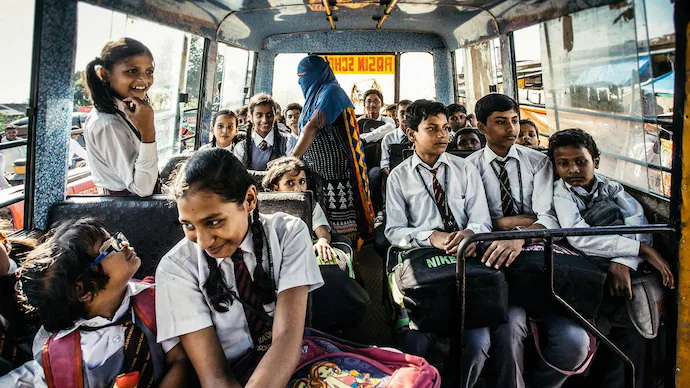- Courses
- GS Full Course 1 Year
- GS Full Course 2 Year
- GS Full Course 3 Year
- GS Full Course Till Selection
- Answer Alpha: Mains 2025 Mentorship
- MEP (Mains Enrichment Programme) Data, Facts
- Essay Target – 150+ Marks
- Online Program
- GS Recorded Course
- Polity
- Geography
- Economy
- Ancient, Medieval and Art & Culture AMAC
- Modern India, Post Independence & World History
- Environment
- Governance
- Science & Technology
- International Relations and Internal Security
- Disaster Management
- Ethics
- NCERT Current Affairs
- Indian Society and Social Issue
- NCERT- Science and Technology
- NCERT - Geography
- NCERT - Ancient History
- NCERT- World History
- NCERT Modern History
- NCERT Medieval History
- CSAT
- 5 LAYERED ARJUNA Mentorship
- Public Administration Optional
- ABOUT US
- OUR TOPPERS
- TEST SERIES
- FREE STUDY MATERIAL
- VIDEOS
- CONTACT US
UJALA: 10 Years of Energy-Efficient Lighting
UJALA: 10 Years of Energy-Efficient Lighting
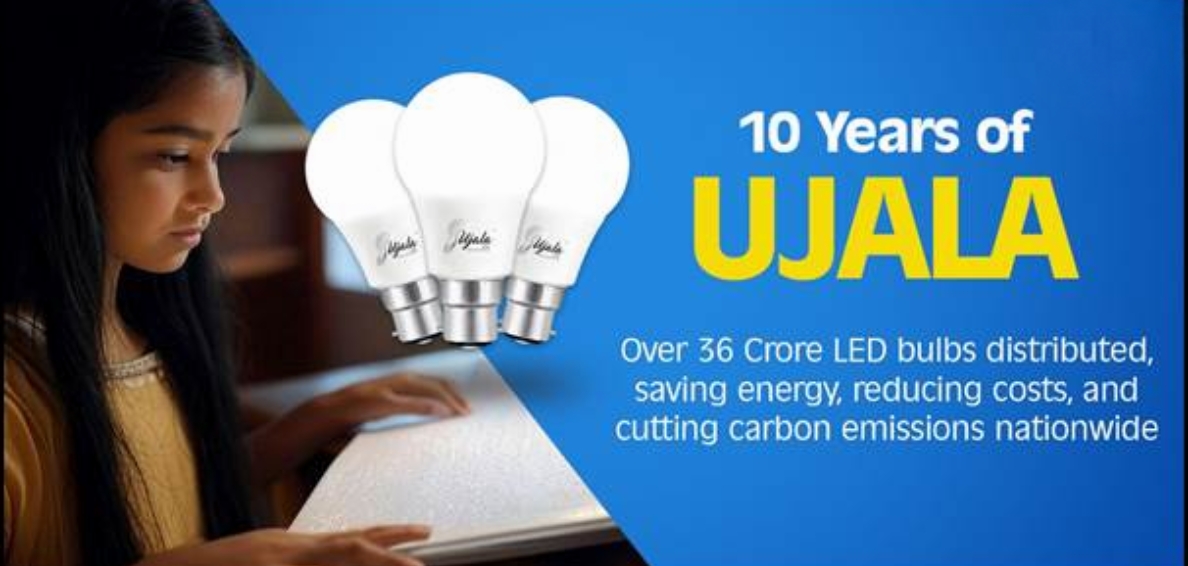
On 5th January 2015, Prime Minister Narendra Modi launched the UJALA (Unnat Jyoti by Affordable LEDs for All) scheme, initially called the Domestic Efficient Lighting Programme (DELP). This program aimed to bring affordable, energy-efficient LED bulbs, tube lights, and fans to every Indian household, marking a significant shift towards energy conservation, reduced costs, and environmental sustainability.
Key Partners & Execution:
- Energy Efficiency Services Limited (EESL): Implementing agency.
- DISCOMs (Distribution Companies): Partnered to distribute products.
- Ministry of Power: The overarching body coordinating the program.
The Need for UJALA
Before UJALA, traditional lighting systems in India were highly inefficient:
- Incandescent Lamps (ICLs) and Compact Fluorescent Lamps (CFLs) consumed a large amount of electricity, contributing to high electricity costs and excessive energy consumption.
- In 2014, LED bulbs were priced between ₹450-500, which was significantly higher than CFLs (₹100–150) and ICLs (₹10–15). This price disparity made it difficult for many households to switch to energy-efficient lighting.
Energy Efficiency Benefits of LEDs:
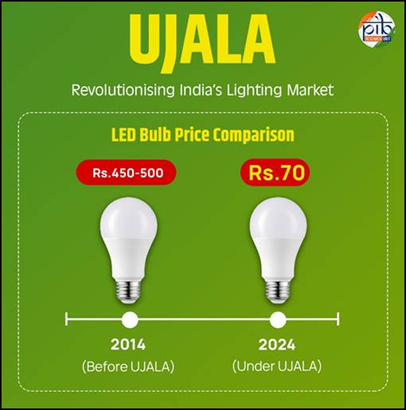
- LED bulbs use only 1 unit of electricity for 140 hours of usage, compared to 2 units for CFLs and 9 units for ICLs over the same period.
- A 7W LED bulb provides the same light output as a 14W CFL and a 60W ICL, meaning LEDs consume up to 90% less energy than ICLs and 50% less energy than CFLs.
UJALA Scheme Features and Pricing
The UJALA scheme aimed to make energy-efficient LED bulbs, tube lights, and fans available at affordable prices to reduce consumer electricity costs. The scheme also ensured the availability of these appliances through competitive bidding, bringing the prices down substantially.
Prices Under the UJALA Scheme:
- LED Bulb: ₹70 per bulb
- LED Tube Light: ₹220 per tube light
- Energy-Efficient Fan: ₹1110 per fan
These prices were made possible due to the transparent procurement process and subsidies.
Economic and Environmental Impact of UJALA
Energy Savings:
-
Annual Cost of Ownership:
- LED Bulb: ₹12 per year (1 unit per 140 hours)
- CFL: ₹40 per year (2 units for 140 hours)
- ICL: ₹108 per year (9 units for 140 hours)
-
Energy Consumption Comparison:
- LED Bulb: 1 unit of electricity for 140 hours
- CFL: 2 units of electricity for 140 hours
- ICL: 9 units of electricity for 140 hours
The lower cost of LEDs results in significant savings for consumers and helps reduce the demand for power on a national scale.
Carbon Emission Reduction:
- By switching to LED bulbs, the UJALA program has helped reduce carbon emissions, contributing to India’s climate change mitigation efforts.
UJALA’s Decade of Impact (2015–2025)
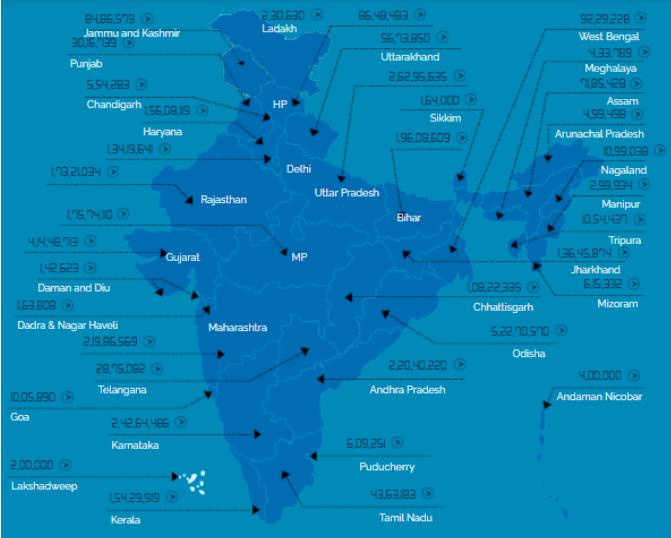
As of January 6, 2025, the UJALA scheme has achieved:
- Distribution of 36.87 Crore LED Bulbs nationwide.
- 407.92 Crore LED Bulbs Sold in the Indian market since the launch of UJALA.
- Over 36 Crore Households benefitted from the UJALA initiative.
Key Achievements:
- Electricity Bill Savings: Over ₹22,000 Crore saved annually by households across India due to the widespread adoption of LEDs.
- Carbon Emissions: The shift to LED lighting has helped avoid the emission of 46 million metric tonnes of CO₂ annually.
Street Lighting National Programme (SLNP)
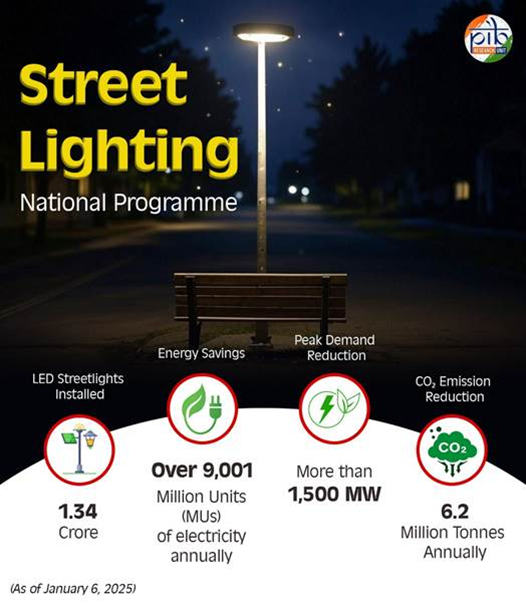
In addition to UJALA, the Street Lighting National Programme (SLNP) was also launched on 5th January 2015 to make public streetlights energy-efficient. This program has transformed India’s street lighting infrastructure by replacing conventional streetlights with LED streetlights.
Key Objectives of SLNP:
- Energy Efficiency: Reduce electricity consumption in street lighting systems.
- Cost Reduction: Save operational costs for municipalities and local bodies.
- Environmental Impact: Reduce CO₂ emissions through the adoption of energy-efficient lighting.
Financial Model:
- EESL finances the initial cost of installing LED streetlights.
- Municipalities repay the investment through monthly or quarterly annuities.
Key Achievements of SLNP (as of January 2025):
- 1.34 Crore LED Streetlights installed across Urban Local Bodies (ULBs) and Gram Panchayats.
- Annual Energy Savings of 9,001 Million Units (MUs).
- Reduction in Peak Demand: 1,500 MW of peak demand reduced due to energy-efficient street lighting.
- CO₂ Emissions Reduced: 6.2 Million Tonnes of CO₂ saved annually by switching to LED streetlights.
Impact on Municipalities:
- Municipalities benefit from 95% uptime of LED streetlights, ensuring reliable public lighting at lower costs.
- This has enhanced public safety by improving the quality and reliability of street lighting.
UJALA and SLNP: Combined Impact on Energy Efficiency and Sustainability
Both UJALA and SLNP have significantly contributed to India’s energy efficiency goals while also ensuring environmental sustainability.
Combined Achievements:
- Energy Savings: Over 10,000 Million Units (MUs) of energy saved annually through both UJALA and SLNP.
- Carbon Emission Reduction: Combined savings of over 52 million tonnes of CO₂ per year.
- Public Safety: SLNP has improved street lighting across the country, providing safer roads and public spaces.
Economic Impact:
- Over ₹30,000 Crore saved by Indian consumers annually due to the combined effect of UJALA and SLNP.
Conclusion
As the UJALA scheme celebrates its 10th anniversary, it stands as a transformative model for energy efficiency in India. Over 36 crore LED bulbs distributed have resulted in substantial savings on electricity bills for millions of households and a significant reduction in India’s carbon emissions. UJALA has not only led to an energy-efficient revolution in the domestic lighting sector but also made significant contributions towards India’s sustainability goals.
|
Also Read |
|




